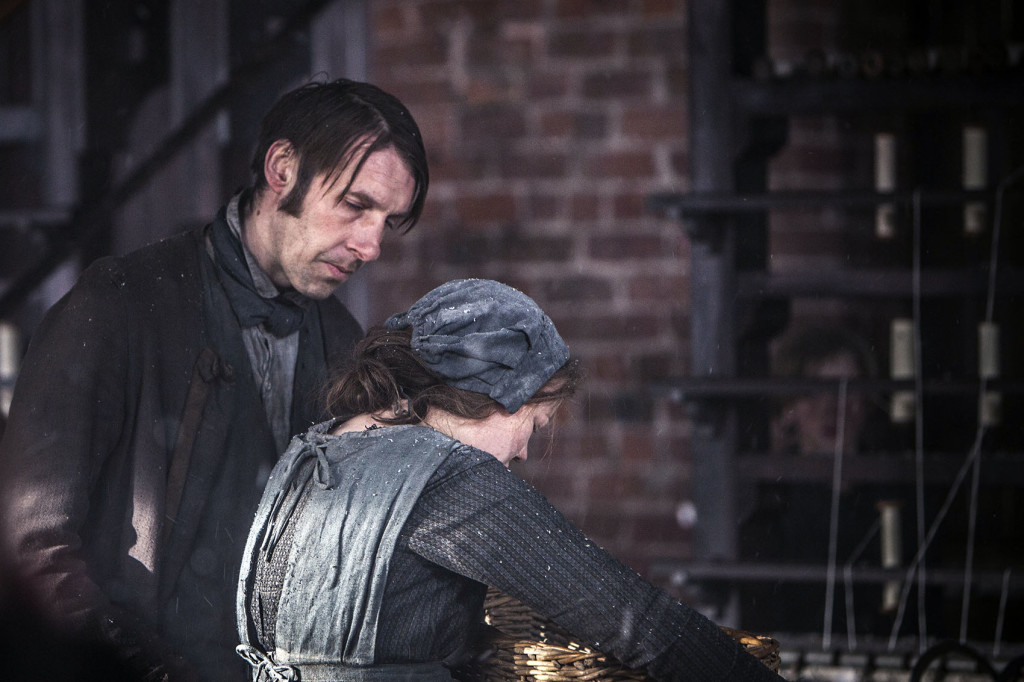
Esther is determined to fight for her rights
The Mill improved on last week’s episode, with fewer lingering glances and stretched out scenes, the characters have become far more engaging and the storyline about the abolitionist meeting was a real highlight.
We catch up with Esther Price (Kerrie Hayes) in Manchester for her court appearance, as she assaulted the overseer Charlie Crout (Craig Parkinson) in the previous episode. Esther stole the clapper from the bell and then hit Charlie with it, as he was about to assault her in the privy. Esther makes her case before the judge, who agrees with her statement that she acted in self-defence. She only gets a fine and is spared jail, but Esther gets confused when she hears the court thinks she’s 15 years old when in fact she’s 17.
It started to grate somewhat, as Esther kept repeating to everyone who could hear, what the court thought her age was. Thankfully Daniel Bate (Matthew McNulty) provides her with an explanation, as stating she’s 15, means the mill have an extra two years before they’re forced to pay her wages.
The Greg family members, are characters you can’t help but find immensely disagreeable. The character of Robert Greg (Jamie Draven) in particular is a really nasty piece of work. Appearing before the commission, he lies about how he treats the workers, the children and how working 12 hours a day in the mill won’t damage their health. Business means everything, and after the humiliation at court he dismisses Crout – who in response, discloses the identity of the father of Susannah Catterall’s (Holly Lucas) child…which turns out to be William Greg (Perry Fitzpatrick),
Crout was an obnoxious man but he’s right when he said that the Gregs are hypocrites when it comes to moral values. Robert Greg can’t risk another embarrassment, and buys Susannah her silence, asking her to name Crout as the father. In return she gets to work with Daniel, who’s developing a new loom for the mill.
Hannah Greg (Barbara Marten) the matriarch, is exceptionally naive when it comes to understanding the situation of the workers at the mill. She takes young Tommy (Connor Dempsey), who’s still recovering after having lost his hand in the accident, under her wing as a pet project. She later attends an abolitionist meeting, bringing Tommy with her. It was very interesting and gripping to hear the testimonial of the freed slave Mary Prince (Flo Wilson), talking about the reality of slavery and the abuse by the masters.
Hannah is intrigued, but the political campaigner John Doherty (Aidan McArdle) calls her a slave-owning hypocrite – as the family owns a cotton plantation in the Caribbean.
Assuming Esther would have been jailed in Manchester, Mr Timperley (Kevin McNally) was sent to the workhouse in Liverpool, where he collected two sisters Lucy (Katherine Rose Morley) and the sickly Catherine Garner (Kaitlyn Hogg). Catherine is too weak to stay on and is being sent back, but Mr Timperley decides to let the young child walk free instead.
Esther is determined to fight for her rights, and wants to prove her real age – Daniel tells her that she’ll need a birth certificate from Liverpool to achieve that. Lucy, who’s inconsolable after Catherine was sent away, agrees to help Esther in Liverpool, in return for help finding her sister. The girls are planning to escape the Quarry Bank Mill, but for poor little Catherine, all help will be too late.
Based on actual events, the series showcases this bleak part of rural history very well. It’s very easy to get into the atmosphere of the gloomy, dusty and very loud workplace! It will be interesting to see if Daniel will join John in the political campaign, to force the 10 hour work day for children through. The last images stays with you for quite a long time, as we see that Catherine never made it into the town, Mr Timperley was sending her to. His motives become rather questionable, did he set her free because he truly didn’t want her to return to the workhouse, or did he knew the sickly child was never going to make it very far? He had the choice to drive her to the town, but didn’t…
The Mill is an educational yet enjoyable watch, there’s a real flow in the episode with the three groups of characters : the workers, the master family and the campaigners, mixing scenes together and interacting with each other. With The Mill you get a glimpse into the history of the Industrial Revolution, the many human sacrifices and the hardship it took to get to the Modern World we live in now.
The Mill continues on Channel 4 next Sunday at 8.00 pm











